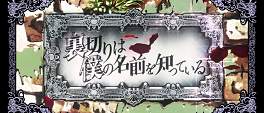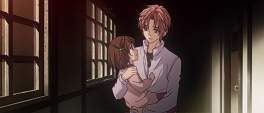You'd be forgiven for recalling Aerosmith's "Dude Looks Like a Lady" in the opening credits of the voluminously titled Uragiri wa Boku no Namae wo Shitteiru; not for the song's namesake but because were it not for the obvious breasts, the lady would certainly resemble a gentleman. This is not surprising with an art style that revels in the androgynous, emblematic of a genre commonly characterised by male homosexual romances. Nothing in the opening episodes attempts to dispel this association, in many ways it revels in it with the liberal use of tropes that are keen to imply rather than extol. Despite the genre trappings however, the opening episodes are a muted but disappointing introduction to a series which while not widely accessible, plays to its strengths despite the ultimately derivative result of doing so.
Yuki is an orphan, found abandoned in a hedge with only his name affixed to him, growing up feeling that he was unwanted by his parents. It doesn't help that he has the ability to see people's pasts and emotions with only a touch, making him increasingly isolated despite his looks earning him scores of adoring fans. Yuki's life is shaken up when his supposed half-brother makes an appearance and his ability to read other's emotions spins into overdrive, manifesting the unfortunate ability to shatter all glass around him. The sibling, Takashiro, seems to be involved was mysterious silver-eyed man, Zess, who saves Yuki when a classmate takes a deadly interest in him. Yuki's ability may yet come to have some greater significance and his life shows no indication of settling back down.
By and large, the series utilises an aesthetic that was nigh on perfected by CLAMP with series such as X and Clover, but strips away the delicate style and ladles on copious helpings of gothic stereotypes including long leather coats, chokers, ornate metal claws, crucifixes and chains - all of which are available singularly on most characters but wholesale on the vampire saviour Zess. Not content with fantasy, romance and gothic overtures, the writers felt the need to introduce vampirism in order to cover all possible recent schoolgirl fancies. The boys' love iconography is used just as hamfistedly with the opening and ending ticking all the boxes with thorns, roses, chains, violins, tears and blood; the story similarly rife with guilt and emotional trauma, longing glances and weighty physical contact. This oversaturation of genre staples leaves no room for the series to nurture its own story, instead simply rehashing narratives and symbolism from any number of other sources.
Were the characters or story able to balance the severe lack of innovation then the opening episodes would be tolerable, unfortunately their mediocrity is drowned out by their staunch adherence to archetypes all of which err on the side of the aloof and unfeeling but secretly a sensitive. Apart from the women who are attentive, graceful and the only bright lights in a world populated by frowns and stoic metrosexual manliness. The story, what little there was in between all of the rain soaked talks and sunset walks, is typically uninventive dross that has to do with a family with special powers and an ancient evil sorcerer - the result being a collection of jarringly computer generated critters that break like glass when struck with any of the multitude of magical weaponry summoned from natty power rings. Collectively the narrative is glacial and uninspiring: switching off for two thirds of an episode is likely to result in the same experience as sitting through its entirety.
Judging Uragiri wa Boku no Namae wo Shitteiru on pedestrian details such as character development or plotting when it is increasingly obvious the target audience should be content with an unimaginative premise, chopped and screwed from other more defining series. Its saving grave may be the better than average visuals which initially maintain detail but beyond the first episode erode in quality until the backgrounds overshadow the smudgy, spindly characters who stride about oblivious to their freakish proportions or vacuum moulded hair. Whether the series ends up being a more fulfilling experience for those familiar with the overarching genre will be an exercise in patience - it may be antithetical to the cornucopia of shows featuring largely female casts but its rarity, lack of levity and refusal to grow beyond the confines erected by its peers grants it no special dispensation. Mediocre at best, insulting and derivative at worst this is for only the most ardent of genre fans.







